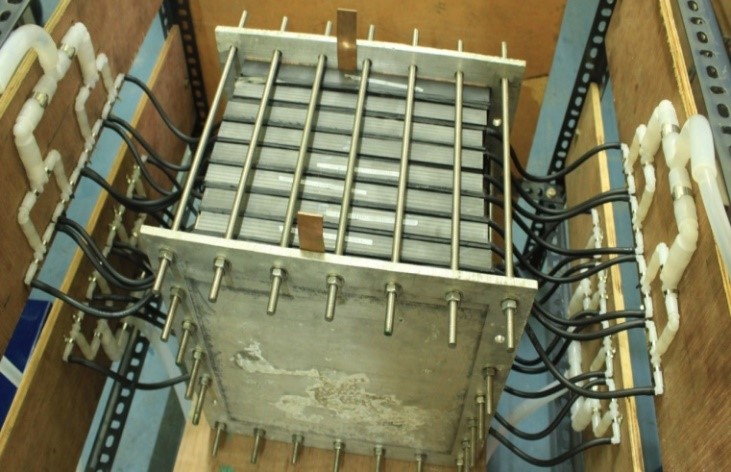From pv magazine International
Scientists at the Indian Institute of Technology Madras (IIT Madras) have developed a kilowatt-scale vanadium redox flow battery to store electricity generated by wind and solar projects.
The researchers said the system, which is the first of its kind to be manufactured in India, can be directly deployed in industrial-scale stacks for grid-level storage. “The efficacy of the new designs has been verified experimentally,” they said.
They told pv magazine that the storage system has a rated power capacity of 5 kW and 8 kW of peak power, with 25 kWh of storage capacity. Its energy density ranges from 30 watt-hours to 40 watt-hours per liter, with a round-trip efficiency of more than 70% at rated power and 60% at peak power.
“The storage capacity can be easily increased by increasing the volume of the electrolyte in the reservoirs or by adding new reservoirs while maintaining the same number of stacks,” researcher Ravendra Gunlapalli said. “Similarly, if the power rating needs to be increased, more stacks can be connected to the same reservoirs.”
Each stack features 16 cells, with each cell measuring 1,500 cm2. The electrolyte is made of vanadium oxide sulfate hydrate and the electrode is made of graphitized carbon felt.
The researchers used three-dimensional complex geometry and mesh elements for the computational fluid dynamics (CFD) simulations to study the flow distribution and overall pressure drop in the cell.
“This combination of experiments and simulations for cell sizes in the range 400 to 1500 cm2 in several types of flow fields have not been reported in the literature and constituted the major contributions of the present work,” they said. “The improved understanding generated from these comprehensive studies led to two patented innovative ideas tested at cell and stack level.”
This content is protected by copyright and may not be reused. If you want to cooperate with us and would like to reuse some of our content, please contact: editors@pv-magazine.com.









By submitting this form you agree to pv magazine using your data for the purposes of publishing your comment.
Your personal data will only be disclosed or otherwise transmitted to third parties for the purposes of spam filtering or if this is necessary for technical maintenance of the website. Any other transfer to third parties will not take place unless this is justified on the basis of applicable data protection regulations or if pv magazine is legally obliged to do so.
You may revoke this consent at any time with effect for the future, in which case your personal data will be deleted immediately. Otherwise, your data will be deleted if pv magazine has processed your request or the purpose of data storage is fulfilled.
Further information on data privacy can be found in our Data Protection Policy.